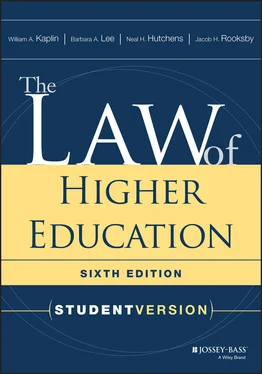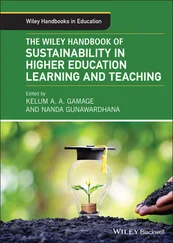Beyond such statutory rights, several common law theories for protecting individual rights in private postsecondary institutions have been advanced. Most prominent by far is the contract theory, under which students and faculty members are said to have a contractual relationship with the private school. A related claim of breach of fiduciary dutyhas also been gaining attention in recent years, in particular for student claims (see Section 7.1.3). Under the contract theory, implied contract terms as well as express terms may establish legal rights enforceable in court if the contract is breached. Although the theory is a useful one that is often referred to in the cases (see Sections 5.2.1 and 7.1.3), most courts agree that the contract law of the commercial world cannot be imported wholesale into the academic environment. The theory must thus be applied with sensitivity to academic customs and usages. Moreover, the theory's usefulness is somewhat limited. The “terms” of the “contract” may be difficult to identify, particularly in the case of students. (To what extent, for instance, is the college catalog a source of contract terms?) Some of the terms, once identified, may be too vague or ambiguous to enforce. Or the contract may be so barren of content or so one-sided in favor of the institution that it is an insignificant source of individual rights.
Despite its shortcomings, the contract theory has gained in importance. As it has become clear that most private institutions can escape the tentacles of the state action doctrine, students, faculty, and staff have increasingly had to rely on alternative theories for protecting individual rights. Since the lowering of the age of majority, postsecondary students have had a capacity to contract under state law—a capacity that many previously did not have. In what has become the age of the consumer, students have been encouraged to import consumer rights into postsecondary education. And, in an age of collective negotiation, faculties and staff have often sought to rely on a contract model for ordering employment relationships on campus (see Section 4.3).
In addition to contract principles, some courts have also recognized that private colleges and universities operate under an obligation to demonstrate basic fairness in the treatment of students or to not treat them in an arbitrary or capricious manner. The issue of fundamental fairness apart from contract principles has arisen in recent years in litigation brought by students disciplined for engaging in sexual misconduct that violated provisions of the institutional student conduct code (see Section 11.5.3.4). In an illustrative case, Doe v. Brandeis University , 177 F. Supp. 3d 561 (D. Mass. 2016) (see Section 11.5.3.4 for discussion of claims brought by students accused of sexual misconduct), a federal district court considered whether Brandeis University failed to treat a student with basic fairness in the handling of an allegation of sexual misconduct. The court said that, “Although the relationship between the university and its students is essentially contractual, the university's disciplinary actions may also be reviewed by the courts to determine whether it provided ‘basic fairness’ to the student” (177 F. Supp. 3d at 572). The court stated that the university's “obligation to provide basic fairness in its proceedings is separate from and in addition to its contractual obligations to follow rules” set forth in the student handbook (177 F. Supp. 3d at 601).
State constitutions have also assumed critical importance as a source of legal rights for individuals to assert against private institutions. The key case is Robins v. PruneYard Shopping Center , 592 P.2d 341 (Cal. 1979), affirmed , PruneYard Shopping Center v. Robins , 447 U.S. 74 (1980). In this case a group of high school students who were distributing political material and soliciting petition signatures had been excluded from a private shopping center. The students sought an injunction in state court to prevent further exclusions.
The California Supreme Court sided with the students, holding that they had a state constitutional right of access to the shopping center to engage in expressive activity. In the U.S. Supreme Court, the shopping center argued that the California court's ruling was inconsistent with an earlier U.S. Supreme Court precedent, Lloyd v. Tanner , 407 U.S. 551 (1972), which held that the First Amendment of the federal Constitution does not guarantee individuals a right to free expression on the premises of a private shopping center. The Court rejected the argument, emphasizing that the state had a “sovereign right to adopt in its own constitution individual liberties more expansive than those conferred by the federal Constitution.” The shopping center also argued that the California court's decision, in denying it the right to exclude others from its premises, violated its property rightsunder the Fifth and Fourteenth Amendments of the federal Constitution. The Supreme Court rejected this argument as well.
PruneYard has gained significance in educational settings with the New Jersey Supreme Court's decision in State v. Schmid , 423 A.2d 615 (N.J. 1980) (see Section 11.1.2 of this book). The defendant, who was not a student, had been charged with criminal trespass for distributing political material on the Princeton University campus in violation of Princeton regulations. The New Jersey court declined to rely on the federal First Amendment, instead deciding the case on state constitutional grounds. It held that, even without a finding of state action (a prerequisite to applying the federal First Amendment), Princeton had a state constitutional obligation to protect Schmid's expressional rights (N.J. Const. art. I, paras. 6, 18). In justifying its authority to construe the state constitution in this expansive manner, the court relied on PruneYard . A subsequent case involving Muhlenberg College, Pennsylvania v. Tate , 432 A.2d 1382 (Pa. 1981), follows the Schmid reasoning in holding that the Pennsylvania state constitution protected the defendant's rights.
In contrast, a New York court refused to permit a student to rely on the state constitution in a challenge to her expulsion from a summer program for high school students at Cornell. In Stone v. Cornell University , 510 N.Y.S.2d 313 (N.Y. App. Div. 1987), the 16-year-old student was expelled after she admitted smoking marijuana and drinking alcohol while enrolled in the program and living on campus. No hearing was held. The student argued that the lack of a hearing violated her rights under New York's constitution (art. I, § 6). Disagreeing, the court invoked a “state action” doctrine similar to that used for the federal Constitution (see Section 1.5.2) and concluded that there was insufficient state involvement in Cornell's summer program to warrant constitutional due process protections.
Additional problems may arise when rights are asserted against a private religious (rather than a private secular) institution (see generally Sections 1.6.1and 1.6.2below). Federal and state statutes may provide exemptions for certain actions of religious institutions (see, for example, Section 4.7). Furthermore, courts may refuse to assert jurisdiction over certain statutory and common law claims against religious institutions, or may refuse to grant certain discoveryrequests of plaintiffs or to order certain remedies proposed by plaintiffs, out of concern for the institution's establishment and free exercise rights under the First Amendment or parallel state constitutional provisions (see, for example, Section 5.2.4). These types of defenses by religious institutions will not always succeed, however, even when the institution is a seminary. In McKelvey v. Pierce , 800 A.2d 840 (2002), for instance, the New Jersey Supreme Court reversed the lower court's dismissal of various contract and tort claims brought by a former student and seminarian against his diocese and several priests, emphasizing that “[t]he First Amendment does not immunize every legal claim against a religious institution and its members.”
Читать дальше












